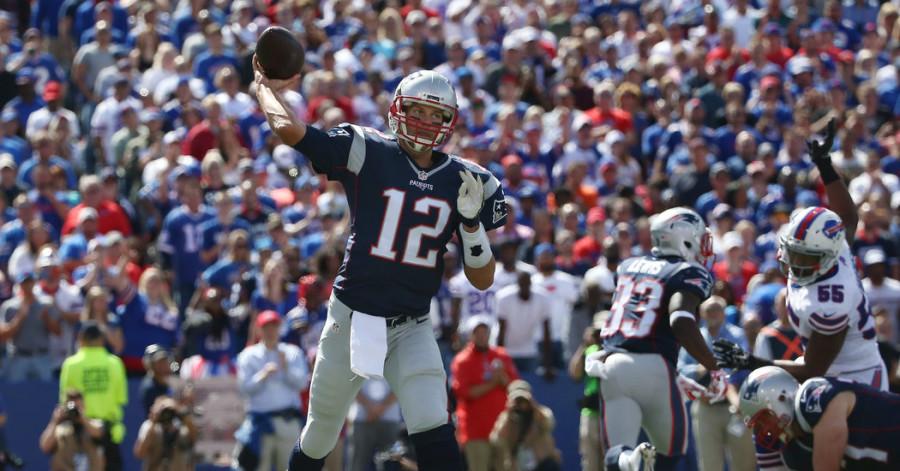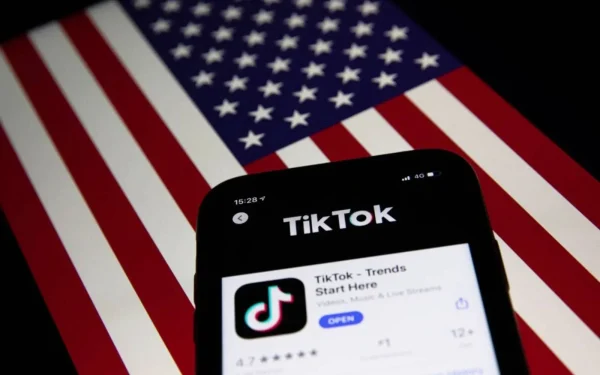Where’s the Integrity?
What lessons have been learned from the NFL’s DeflateGate scandal when seen through the eyes of Benjamin’s focus on integrity?
Brady throws a pass against the Buffalo Bills on September 20, 2015. With the revoked suspension, Brady is off to a torrid start, throwing for 754 yards, 7 touchdowns, and no interceptions in the first two games of the season.
In today’s world, professional athletes are heroes, but sometimes our heroes don’t always act the way they should. When that happens someone must discipline them. In the NFL, that man is Roger Goodell, the league commissioner. Despite the fact that he is the head of the league, Goodell does not have much support from players or owners right now. Just recently, a federal judge turned over the NFL’s decision to suspend New England Patriots’ quarterback Tom Brady four games for involvement in the DeflateGate scandal and non-cooperation with the NFL after last January’s AFC Championship game.
It all began after the Patriots defeated the Indianapolis Colts in the AFC championship game. Soon there was a report from WTHR’s Bob Kravitz in Indianapolis stating the Patriots were suspected of tampering with the footballs they used in the game. The NFL hired Ted Wells, an attorney, to investigate the Patriots’ footballs. In April, Wells released a report that stated Brady was “generally aware” of the deflation of the Patriots’ footballs prior to the game. However, the “Wells Report” had no hard evidence and many critics and pundits claimed it was circumstantial at best. The non-cooperation the NFL cited in its suspension of Brady related to Brady’s refusal to hand over his cell phone and the quarterback’s subsequent destruction of the phone.
Yes, the Well Report stated Brady was was “generally aware” of footballs being tampered with and the megastar QB didn’t help his cause by destroying his phone, but let’s look at some of the facts that have been revealed during this whole sloppy mess known as DeflateGate:
- ESPN’s Chris Mortensen erroneously reported that 11 of the Patriots’ 12 footballs were at least 2 psi below the minimum league threshold of 12.5 psi. In reality, only one of the balls was two pounds below the allowable 12.5 psi. Mortensen has since backpedaled from this false report, though he won’t name the NFL source that provided him with that info.
- The Ideal Gas Law: states that inflated objects will lose air pressure when moved from a warm environment to a cooler environment. An experiment by Thomas Healy, a graduate student studying mechanical Engineering at Carnegie Mellon University, tested the Ideal Gas Law using footballs with a similar drop in temperature to the AFC Championship Game. He found that the pressure in the footballs decreased significantly in colder weather, and even more so in wet conditions, as was the case in the game against the Colts as it was raining. Healy’s measurements were endorsed by Max Tegmark, an MIT physics professor.
- Neither the AFC Championship Game officials, NFL Head of Officiating Dean Blandino, Commissioner Roger Goodell, or NFL Executive VP of Football Operations Troy Vincent had ever heard of the Ideal Gas Law and, therefore, did not apply it to the conditions surrounding the AFC Championship Game.
- Since DeflateGate and presumably playing with regulation game balls, the patriots are 3-0 dating back to February’s Super Bowl.
[/sidebar]
As a result, Goodell suspended Brady 4 games based on the Wells Report, took the Patriots’ first and fourth round draft picks, and fined the Patriots $1 million. Brady appealed his suspension, which again, was overseen by Goodell, and Goodell upheld the four-game ban. Brady then took his case to federal court where the suspension was overturned, basically because the judge felt the Well Report was not completely independent and because Goodell had no precedent on which to base his suspension. The Patriots, with Brady at the helm, proceeded to beat the Pittsburgh Steelers and then the Buffalo Bills during the first two weeks of the current NFL season.
The back-and-forth battle that dragged this case on for nearly eight months (and is still ongoing as the NFL plans to appeal the court’s reversal) has tarnished the reputation of the Patriots organization (in seemingly everywhere but New England) and the NFL.
Seventh grader Julian DiFillippo is not a fan of the Patriots at all, and blames coach Bill Belichick for all the unfair play by the Patriots. “It was really the coach [Belichick] who should take the punishment, because he’s the one who basically told Brady [to deflate the footballs].”
The NFL, however, has cleared Belichick from any wrongdoing. Some people, don’t think Deflategate was Brady’s fault at all, but hold the Patriots organization fully accountable.
“If I could change the suspension, I would make no suspension [for Brady], a larger fine and loss of [more] draft picks,” said eighth grader Ned Murphy. “They had no proof Brady did anything, [the NFL] should have punished the whole team, not just Brady.”
Others point to the incompetence of the NFL throughout this ordeal.
In an article by Kevin Clark that appeared in The Wall Street Journal after Brady’s suspension was overturned, Howard Wasserman, a law professor at Florida International University, stated, “There were so many problems with the [NFL’s disciplinary] procedure. A lot of this was Goodell running to fill in a lot of holes on his own, and using ‘integrity of the game’ as this catchall term for just about anything that wasn’t prohibited by some other provision.”
DeflateGate is the latest in a series of unfavorable public relation gaffes by the NFL that include the backlash the league received for mishandling the BountyGate scandal involving the New Orleans Saints, the Ray Rice domestic abuse scandal, and the Adrian Peterson controversy regarding the discipline of his four-year-old-son.
Was DeflateGate a witch hunt by the NFL against Tom Brady, or did Brady and the Patriots pull the wool over the eyes of the federal court? No matter what the answer is, the integrity of both parties has come into question.
Here at Benjamin, we understand the importance of integrity. It is one of the School’s 10 core values which also include acceptance, compassion, courage, fairness, forgiveness, kindness, morality, respect, and responsibility. The emphasis Benjamin places on integrity was most recently demonstrated at the Honor Code Assembly in which all middle school students promised, via their signature, to not lie, cheat, or steal, nor tolerate anyone who does.
What is the message the Patriots, the NFL, and America’s federal court system are passing along to those who tune in to watch professional football every Sunday? Is the message that it’s okay to cheat? Even if Brady is not guilty, then why was Goodell so insistent upon having him punished? Was he afraid, after all the bad PR the league has received, to look “soft” or weak if he didn’t dole out a punishment for an alleged assault on “the integrity of the game”?
“If a middle school quarterback deflated a football or cheated, I would lose a lot of respect for that person, but I’d also want to know why,” said eighth grader Vance Hendryx. “I think there’s no point in cheating.”
The Patriots, guilty or not, have been labeled as cheaters. They have lost the respect and trust of other teams and fans across America. The NFL commissioner’s office has also lost the trust of their fans. If a school like Benjamin can place so much importance on integrity, why can’t our heroes whom we look up to do the same?





